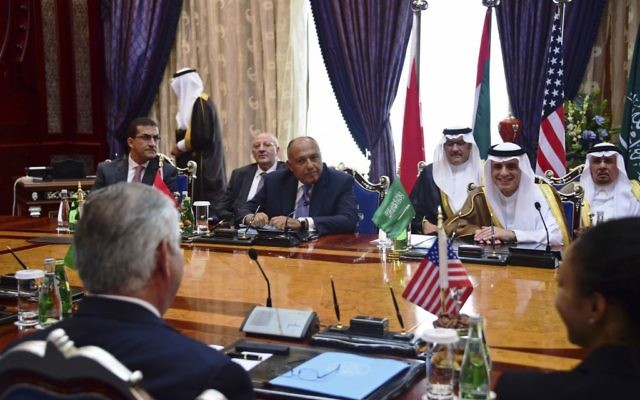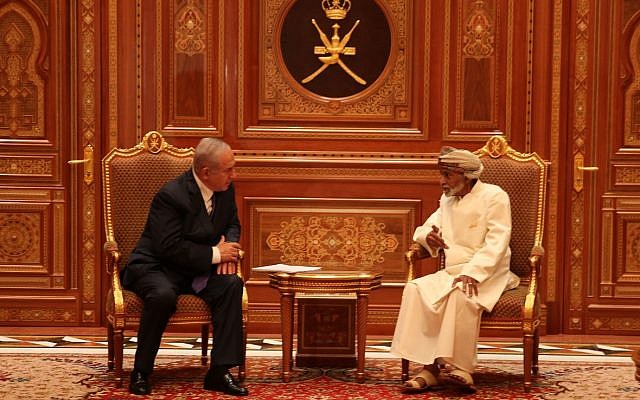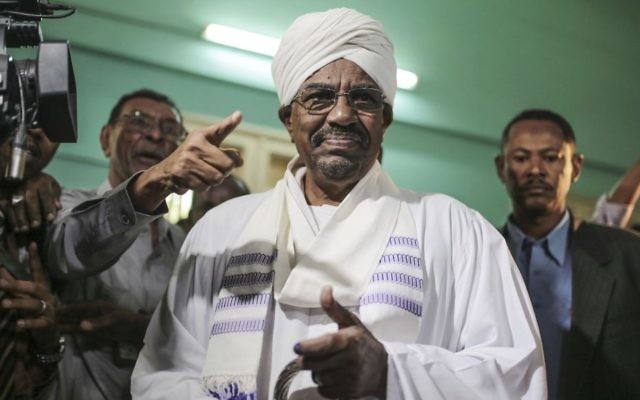News of effort to normalize relations with Manama comes after reports that Israel is eyeing ties with Sudan, as Chadian leader makes historic visit to Israel
Israel is working to normalize ties with Bahrain, as Jerusalem ramps up its drive to forge more open relations with the Arab world amid shifting alliances in the Middle East driven by shared concerns over Iran, Hebrew-language news sites reported late Sunday.
The reports, sourced to an unnamed senior official, did not detail Israel’s efforts to get closer to Manama, but came hours after Prime Minister Benjamin Netanyahu hinted he would soon travel to unspecified Arab states, during a press conference with visiting Chadian leader Idriss Déby Sunday.
Déby’s historic visit is part of a campaign to lay the groundwork for normalizing ties with Muslim-majority countries Sudan, Mali and Niger, according to a report on Israel’s Channel 10 news Sunday.
In May, Bahrain Foreign Minister Khalid bin Ahmed Al Khalifa wrote on Twitter that Israel has the right to defend itself against Iran.

Oman, which has often played the role of regional mediator, welcomed Netanyahu in a surprise visit last month, an apparent sign of Israeli progress in improving ties with Gulf countries.
At a security conference in Bahrain following the visit, Omani foreign minister also offered rare words of support for the Jewish state.
“Israel is a state present in the region, and we all understand this. The world is also aware of this fact and maybe it is time for Israel to be treated the same and also bear the same obligations,” Yussef bin Alawi bin Abdullah said, according to Reuters.

During a press conference with Déby on Sunday, Netanyahu remarked that “there will be more such visits in Arab countries very soon,” without providing details.
The Israeli premier has for years spoken about the warming ties between Israel and the Arab world, citing not only Iran as a common enemy but also many countries’ interest in cooperating with Israel on security and defense matters, as well as Israel’s growing high-tech industry.
The effort to forge ties with Sudan comes as Khartoum has looked to move closer to Sunni Gulf states after years as an ally of Iran.
In early 2017, Khartoum joined Sunni Bahrain and Saudi Arabia in severing its ties with the Islamic Republic.

At the time, the country also appeared to make overtures toward Israel. Foreign Minister Ibrahim Ghandour said in a 2016 interview that Sudan was open to the idea of normalizing ties with Israel in exchange for lifting US sanctions on Khartoum. According to Hebrew-language media reports at the time, Israeli diplomats tried to drum up support for Sudan in the international community after it severed its ties to Tehran.
In the past, Sudan has allegedly served as a way-station for the transfer of Iranian weapons to the Hamas terrorist group in Gaza. Israel has reportedly intercepted and destroyed transfers of weapons from Sudan bound for Gaza.
In 2009, the International Criminal Court also issued an arrest warrant for Sudanese President Omar al-Bashir for genocide, war crimes, and crimes against humanity, relating to the bloody conflict in the western Darfur region.
However, since it broke ties with Iran, Sudan is no longer perceived by Israel as a threat, but rather as a potential ally.
New era
Earlier on Sunday, Déby became the first president of Chad to visit Israel and pledged a new era of relations when meeting Netanyahu, 46 years after ties were severed.
In remarks to journalists after a closed-door meeting, Déby spoke of the two countries committing to a new era of cooperation with “the prospect of reestablishing diplomatic relations.”
Déby said he was “proud” that he had accepted Israel’s official invite. “It can be called breaking the ice,” he said. “We came here indeed with the desire to renew diplomatic relations. Your country is an important country. Your country, like Chad, fights against terrorism.”
Chad, a Muslim-majority, Arabic-speaking country in central Africa, broke off relations with Israel in 1972.
Despite the lack of formal ties, both Déby and Netanyahu on Sunday stressed the centrality of security cooperation between the two countries.
Chad is also one of several African states engaged in Western-backed operations against Boko Haram and Islamic State jihadists in West Africa. Earlier this month, the US donated military vehicles and boats worth $1.3 million to Chad as part of the campaign against Islamist militancy in the country.

Under Déby, Chad’s government has been accused of widespread human rights abuses and rigged elections. He took over the arid, impoverished nation in 1990 and won a disputed fifth term in April 2016.
On Sunday, Chadian security sources were quoted by Reuters saying that Israel had sent Chad arms and money earlier this year to help the country in its fight against Islamist groups. Netanyahu in his remarks to journalists thanked Déby for his visit and hailed “flourishing” ties between Israel and African nations. He declined questions about whether the two leaders discussed potential Israeli arms sales to Chad.
Netanyahu portrayed the unprecedented visit as the result of his hard-won diplomatic efforts, referring to his three visits to Africa over the last couple years and his surprise trip to Oman in October.
According to Israel’s Channel 10, Israel’s diplomatic push in Africa is driven in part by a desire to ease air travel to Latin America. Flying in the airspace of traditionally hostile African countries — namely Chad and Sudan — would allow airlines to offer faster, more direct flights between Israel and the continent.
Channel 10 estimated that flying directly from Israel to Brazil over Sudan would shave some four hours off the average journey, which currently takes at least 17 hours, and requires a stopover in either Europe or North America.
Separately, Hadashot television news reported on Sunday that Netanyahu has secured reassurances from Oman that airlines flying to and from Israel — including national carrier El Al — would be permitted to fly over the kingdom’s airspace. The prime minister received this message during his surprise visit to Muscat last month — the first by an Israeli leader in over 20 years, the television report said.



Leave a Reply
You must be logged in to post a comment.